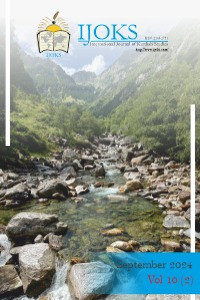Abstract
In an era where the digital realm is redefining the boundaries of learning, the teaching of Arabic acquires new dimensions. This field targets specific audiences with distinct characteristics and complex linguistic needs. In particular, the instruction of Arabic to specialists faces a range of issues and challenges that require focused guidance and attention. This research paper aims to highlight the main issues, such as the diversity of learners’ goals, needs, and motivations. The importance of e-learning and the methodologies for utilizing digital resources to enhance the effectiveness of Arabic language instruction in general with that for specialists and also for general life situations are underscored. Major challenges faced in this process, particularly in the Arab world are discussed. The findings of this study underscore the importance of integrating e-learning and digital tools in teaching Arabic to specialists and highlight the need for greater efforts to develop educational curricula. And recommendations for improving the outcomes of Arabic language education are provided.
Keywords
Arabic language instruction Arabic for specialists Curricula for teaching Arabic E-learning for Arabic Digital reality and teaching Arabic
References
- Abdullah, O. A.-S. (2008). Teaching Arabic to Non-Native Speakers. Egypt: Al-Alamiah Publishing and Distribution House.
- Al-Lahham, Y. K. (1997). Teaching Arabic for Specific Purposes: Developing Model Lessons for Non-Arab Diplomats. Unpublished Master's Thesis. Khartoum, Sudan: Khartoum International Institute for Arabic Language.
- Ashari, A. (1983, 02). Teaching Arabic for Specific Purposes. Arab Journal for Linguistic Studies, 01(02).
- Mahmoud Ismail, S. (1980). Training and Development of Foreign Language Teachers. Scientific Record of the First International Symposium on Teaching Arabic to Non-Native Speakers. Riyadh, Saudi Arabia: Riyadh University.
- Qader, S. A. (2020). E-Learning of Arabic: Reality and Prospects. Al-Arabiya Journal(07).
- Ramishi Rabia, H. N. (2022, 11). Strategies for Teaching Arabic in Light of the Introduction of Electronic Sites. Al-Qari Journal for Critical, Literary, and Linguistic Studies, 05(04).
- Rushdi Ahmad, T. (2003). Institutes for Teaching Arabic to Non-Native Speakers: Development Trends / Accreditation Standards / Quality Indicators. Khartoum: Khartoum International Institute for Arabic Language.
- Yusuf Khalifa, A. B. (1990). Teaching Arabic for Specific Purposes. Seminar on Teaching Arabic in Higher Education Institutions in Sudan. Khartoum, Sudan: National Council for Higher Education.
- Zaid, N. S. (n.d.). Teaching Arabic for Specific Purposes.
Abstract
References
- Abdullah, O. A.-S. (2008). Teaching Arabic to Non-Native Speakers. Egypt: Al-Alamiah Publishing and Distribution House.
- Al-Lahham, Y. K. (1997). Teaching Arabic for Specific Purposes: Developing Model Lessons for Non-Arab Diplomats. Unpublished Master's Thesis. Khartoum, Sudan: Khartoum International Institute for Arabic Language.
- Ashari, A. (1983, 02). Teaching Arabic for Specific Purposes. Arab Journal for Linguistic Studies, 01(02).
- Mahmoud Ismail, S. (1980). Training and Development of Foreign Language Teachers. Scientific Record of the First International Symposium on Teaching Arabic to Non-Native Speakers. Riyadh, Saudi Arabia: Riyadh University.
- Qader, S. A. (2020). E-Learning of Arabic: Reality and Prospects. Al-Arabiya Journal(07).
- Ramishi Rabia, H. N. (2022, 11). Strategies for Teaching Arabic in Light of the Introduction of Electronic Sites. Al-Qari Journal for Critical, Literary, and Linguistic Studies, 05(04).
- Rushdi Ahmad, T. (2003). Institutes for Teaching Arabic to Non-Native Speakers: Development Trends / Accreditation Standards / Quality Indicators. Khartoum: Khartoum International Institute for Arabic Language.
- Yusuf Khalifa, A. B. (1990). Teaching Arabic for Specific Purposes. Seminar on Teaching Arabic in Higher Education Institutions in Sudan. Khartoum, Sudan: National Council for Higher Education.
- Zaid, N. S. (n.d.). Teaching Arabic for Specific Purposes.
Details
| Primary Language | English |
|---|---|
| Subjects | Arabic Language, Literature and Culture |
| Journal Section | Makaleler |
| Authors | |
| Publication Date | September 21, 2024 |
| Submission Date | August 9, 2024 |
| Acceptance Date | September 18, 2024 |
| Published in Issue | Year 2024 Volume: 10 Issue: 2 |
NOTICE: All submissions will be accepted through the Manuscript Submission System. Please click on www.ijoks.com and register to submit a paper.


